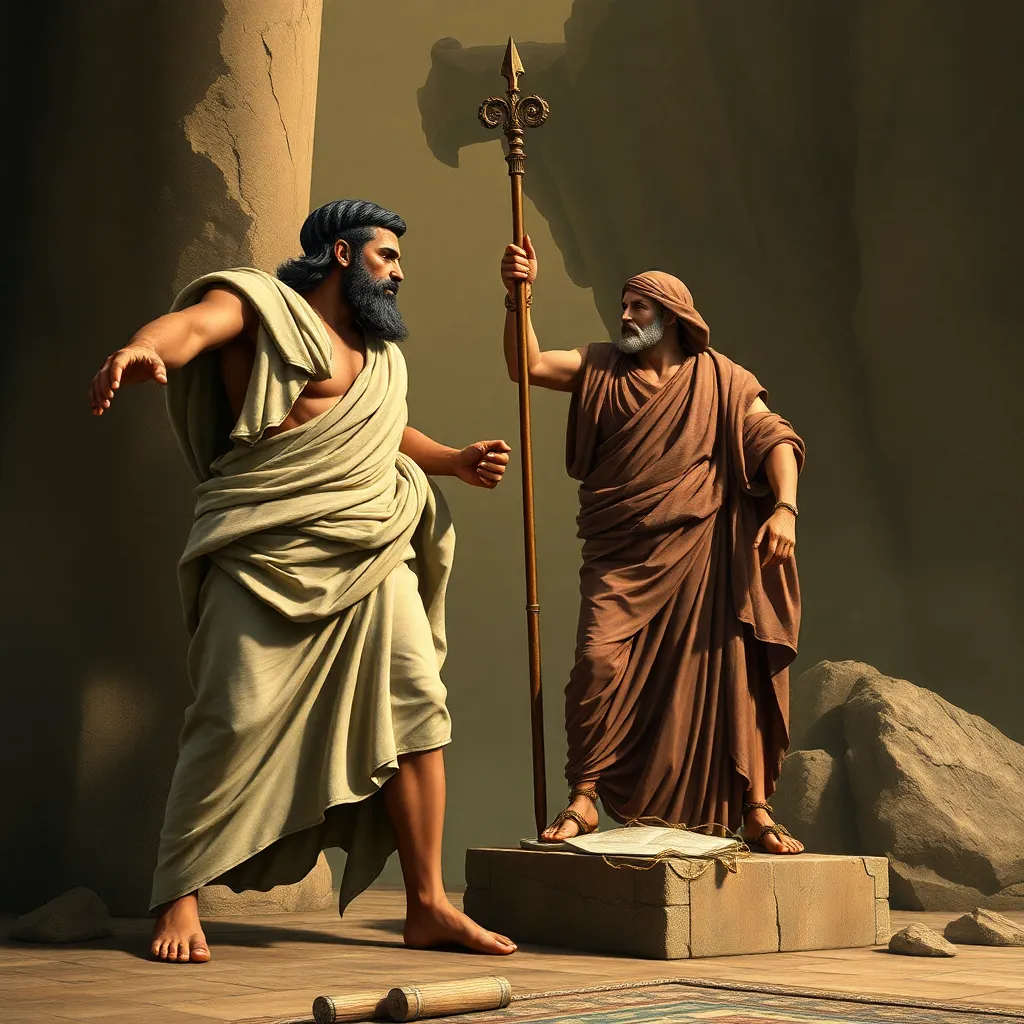The Iliad’s Portrayal of Honor and Shame in Ancient Greek Culture
I. Introduction
The Iliad, attributed to the ancient Greek poet Homer, is one of the cornerstones of Western literature. Composed in the 8th century BCE, it recounts the events of the Trojan War, blending myth, heroism, and the complexities of human emotion. Its significance extends beyond its narrative; it serves as a vital reflection of ancient Greek cultural values, particularly the concepts of honor (time) and shame (aidos).
Honor and shame are central themes in The Iliad, illustrating not only the motivations of its characters but also the societal norms of the time. This article aims to explore how these themes are intricately woven into the fabric of the epic, revealing the values and beliefs that shaped ancient Greek culture.
II. The Concept of Honor in Ancient Greek Society
In ancient Greek culture, honor (time) was a crucial attribute that defined one’s identity and social standing. It represented respect, recognition, and esteem earned through valorous deeds, particularly in warfare.
- Definition of Honor: Honor was not merely a personal trait; it was a communal expectation, deeply rooted in the societal fabric.
- Role of Honor: Honor shaped individual identities and dictated social hierarchies. A man’s worth was often measured by his ability to achieve and maintain honor.
Several characters in The Iliad exemplify the pursuit of honor:
- Achilles: As the epic’s central hero, Achilles is driven by a quest for personal glory and recognition, ultimately leading to his tragic fate.
- Hector: The Trojan prince embodies the honor of his city and family, fighting valiantly against the Greeks to protect his homeland.
III. The Role of Shame in Ancient Greek Culture
Shame (aidos) played a vital role in regulating behavior and maintaining social order. It is the emotion that arises from a failure to live up to societal expectations, particularly regarding honor.
- Definition of Shame: Shame is linked to personal and communal relationships, influencing how individuals are perceived within their society.
- Consequences of Shame: The fear of shame could dictate actions, with profound implications for one’s reputation and legacy.
Instances of shame in The Iliad highlight its significance:
- Achilles’ Withdrawal: Achilles experiences profound shame when Agamemnon takes Briseis, leading him to withdraw from battle, which has dire consequences for the Greek forces.
- Hector’s Death: Hector faces shame in his final moments when he realizes he cannot escape his fate, yet he fights on for the honor of his family and city.
IV. The Dichotomy of Honor and Shame in Character Motivations
The interplay between honor and shame is crucial in understanding the motivations of key characters in The Iliad.
- Achilles: His wrath is fueled by a perceived slight to his honor, which leads to destructive decisions impacting both his fate and that of his comrades.
- Hector: Driven by the honor of protecting Troy and his family, Hector’s motivations are grounded in a sense of duty, even as he faces inevitable shame in defeat.
Honor and shame influence decisions and outcomes throughout the narrative:
- The desire for honor compels characters to engage in fierce battles.
- Shame acts as a powerful motivator, guiding characters toward actions that uphold or restore their reputations.
This dichotomy is especially evident in the context of warfare, where personal honor can lead to collective shame or glory.
V. The Role of Women in the Honor and Shame Narrative
Women in The Iliad also play significant roles in the themes of honor and shame, often acting as catalysts for male action.
- Female Characters: Characters like Helen and Andromache embody the complexities of honor and shame within their societal roles.
- Helen’s Impact: Helen’s abduction ignites the Trojan War, illustrating how female agency can influence male honor.
The societal expectations placed on women further complicate the dynamics of honor:
- Women are often seen as trophies of honor, their value tied to the achievements of their male counterparts.
- Female characters navigate a landscape where their honor is frequently contingent upon the actions and reputations of men.
VI. The Consequences of Honor and Shame in War
The Iliad vividly illustrates the relationship between warfare, honor, and shame. The pursuit of honor can lead to devastating consequences, both personally and collectively.
- Warfare and Honor: Battles are fought not only for survival but also to achieve honor, driving characters to extreme actions.
- Destructive Consequences: The relentless pursuit of honor often leads to tragic outcomes, such as the deaths of beloved heroes and the suffering of their families.
Key battles in The Iliad exemplify this relationship:
- The duel between Achilles and Hector, which symbolizes the ultimate clash of honor, results in loss and devastation for both sides.
- The fall of Troy, driven by the collective pursuit of honor, showcases the destructive power of these themes in warfare.
VII. Cultural Legacy of Honor and Shame in Ancient Greece
The Iliad’s exploration of honor and shame has profoundly influenced subsequent Greek thought and literature.
- Influence on Greek Thought: Philosophers like Aristotle referenced these themes when discussing ethics and morality.
- Resonance in Later Discussions: Honor and shame continue to resonate in philosophical debates about personal identity and societal expectations.
Understanding these themes is crucial for interpreting modern interpretations of honor cultures, highlighting their enduring relevance.
VIII. Conclusion
In summary, The Iliad offers a rich tapestry of honor and shame that reflects the values of ancient Greek society. The interplay between these themes shapes character motivations, influences societal structures, and ultimately provides profound insights into human behavior.
The enduring impact of honor and shame in both ancient and contemporary contexts invites ongoing reflection and study, ensuring that The Iliad remains a vital source for understanding the complexities of human nature and societal expectations.




